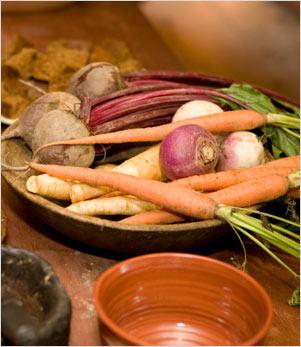|
|
Why not to take root Vegetables? Questioning the Jaina approach
|

|
I was taught early on that a “true Jain” does not eat root vegetables like onions, potatoes, garlic etc.. When asked why not? I never got a convincing answer. I believe that innovation and growth can occur only when one asks questions whose answers are not readily available. In the pursuit of finding answers to these questions, one may stumble upon a breakthrough – a new way of looking at the issue... and more!
I was given many different reasons by different people. Here is my attempt to summarize them.
|
1. root vegetables grow underground, to harvest them we have to disturb the earth and harm many insects and other small creatures.
As Jains we believe in Ahimsa and in minimizing harm to any leaving being, this is a valid reasoning. Although it is no different than plowing the field for agriculture to grow grains and lentils or digging the ground for building temples or mining marbles to build statues. In fact, the conditions of workers digging in the marble mines of India are atrociously sub–human and yet we have chosen to single out and condemn the use of root vegetables and accept all other forms of ’Himsa’ (violence) including killing of millions of silk worms for external appearance!
2. The second reason given is health related. Aurveda classifies onions and garlic as ‘Tamasi’ (creating anger or excitement) food. Since equanimity is an important tenants of Jainism, anything that disturbs the equanimous state in us is not desirable. Although Aurveda also describes many medicinal qualities of both, onion and garlic. Modern medicine also concurs with this and encourages its usage for better health. Positive qualities of ginger, turmeric and many other root vegetables are indisputable even in Aurveda .
3. The third reason most scholars and monks agree with, is based on Jain classification. Vegetables are classified as ‘Pratyek vanaspati’ (individual vegetable) where one body has one soul. e.g. most of the trees and plants of grain, vegetables, fruits etc… and ’Sadharan vanaspati’ (common-body vegetable) where one body has numerous souls. e.g. all root vegetables like potato, onion etc. Some religious leader, few hundred years ago must have looked at this classification and concluded that since root vegetables have many souls, consuming it would destroy multiple souls. Since Jainism believes in minimizing ‘Himsa’ we should forbid consumption of root vegetables. This seems logical and must have been accepted without further thought.
However, looking deeper in to the classification, it becomes apparent that ‘Sadharan vanaspati’ is significantly lower in consciousness than ‘Pratyek vanaspati’. In fact, it is also called ‘Nigodh’ (The lowest form of life). All scholars agree even at this classification.
Muni Shri Nyayvijayji, an undisputed scholar of Jainism had the courage to dig even deeper. In his book ‘Jain Darshan’ used as a textbook in ‘Mahavir Jain Vidhyalaya’ in India, he raises an important issue. Since we believe in minimizing ‘himsa’, someone may argue that killing a very large animal (one soul) to feed many humans for many days is better than killing numerous vegetable souls to hardly feed one human for one day. Thus amount of ‘Himsa’ is linked with the number of souls being killed. Muni Shri explains that this is incorrect argument.
According to Jain thinking, the level of ‘himsa’ is dependent not on the quantity of souls but on the level of consciousness of the killed soul. Thus, killing one soul of higher consciousness is more harmful than killing many souls of lower consciousness.
Based on this argument, killing of many vegetables over one animal for meat is preferred by Jains. Using same argument, consumption of root vegetable is actually better than other (’Pratyek’) vegetables !!!
Is our practice of avoiding root vegetables, based on a faulty interpretation?
I have yet to find any one who could logically dispute Muni Shri Nyayvijayji’s explanation. If any one of the readers can shed further light on this subject, I would greatly appreciate it.
If someone chooses not to eat root vegetables for self-control (Saiyam), it is commendable. We all need to exercise self control in our daily life. All self-control practices are great; even an external one, as long as we do not forget the internal control over our Kashay (anger, ego, greed and deceit).
|
|